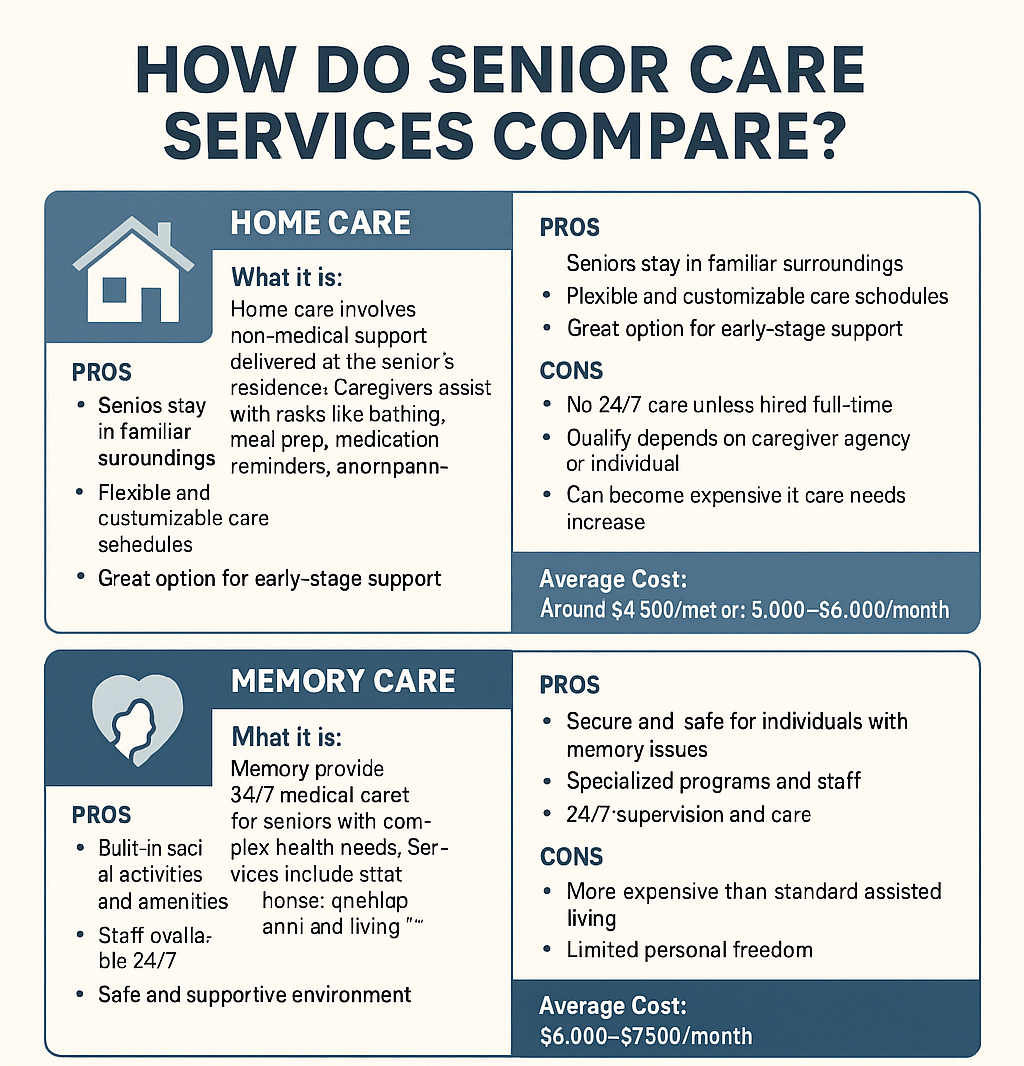Choosing the right type of care for a senior loved one can be a deeply personal choice. That choice can come with financial, emotional, and practical considerations. From aging in place to full-time medical supervision, each option supports different needs and lifestyles. Below, we compare the most common senior care types to help you find the best fit for your family.
How Do Senior Care Services Compare?
| Type of Care |
Description |
Pros |
Cons |
Average Cost |
| Home Care |
Non-medical assistance provided in the senior's home, such as help with daily tasks and companionship. |
Familiar environment
Flexible schedule
Customizable care
|
No 24/7 supervision unless full-time
Quality may vary by caregiver
Costs increase with need
|
$5,000–$6,000/month (full-time) |
| Assisted Living |
Residential facilities offering support with daily living, meals, and social activities. |
Social community
24/7 staff availability
Private or semi-private living
|
Less independence
No skilled nursing care
|
~$4,500/month |
| Memory Care |
Specialized facilities for seniors with Alzheimer's or dementia, offering a secure and structured environment. |
Trained staff
24/7 supervision
Safe and secure environment
|
Higher cost
Limited personal freedom
|
$6,000–$7,500/month |
| Skilled Nursing |
Medical facilities offering 24/7 nursing care for chronic illness, recovery, or rehab needs. |
On-site medical staff
Ideal for complex conditions
Medicare may cover short-term care
|
Institutional feel
Less privacy
|
$7,900–$9,300/month |
| VA Benefits |
Care and financial support for eligible veterans through programs like Aid & Attendance. |
Reduced out-of-pocket costs
Access to VA services
Can supplement other care options
|
Eligibility requirements
Lengthy application process
|
Up to $2,727/month (Aid & Attendance) |
| Independent Living |
Communities designed for seniors who can live independently but want a low-maintenance lifestyle. |
Social amenities
No home upkeep
Ideal for active seniors
|
No personal care services
Not suitable for those with health needs
|
$2,000–$3,500/month |
Home Care
What it is:
Home care involves non-medical support delivered at the senior’s residence. Caregivers assist with tasks like bathing, meal prep, medication reminders, and companionship.
Pros:
- Seniors stay in familiar surroundings
- Flexible and customizable care schedules
- Great option for early-stage support
Cons:
- No 24/7 care unless hired full-time
- Quality depends on caregiver agency or individual
- Can become expensive if care needs increase
Average Cost:
$25–$30/hour or $5,000–$6,000/month for full-time care
Assisted Living
What it is:
Assisted living facilities offer private apartments, meals, housekeeping, and help with daily living activities in a social setting.
Pros:
- Built-in social activities and amenities
- Staff available 24/7
- Safe and supportive environment
Cons:
- Less privacy and autonomy than home
- May not provide medical care
- Monthly rates vary by region
Average Cost:
Around $4,500/month nationally
Memory Care
What it is:
Memory care communities are designed for seniors with Alzheimer’s or other forms of dementia. These facilities offer a secure, structured environment and staff trained in memory-related conditions.
Pros:
- Secure and safe for individuals with memory issues
- Specialized programs and staff
- 24/7 supervision and care
Cons:
- More expensive than standard assisted living
- Limited personal freedom
Average Cost:
$6,000–$7,500/month
Skilled Nursing Facility (Nursing Home)
What it is:
Nursing homes provide 24/7 medical care for seniors with complex health needs. Services include medication management, wound care, rehab, and more.
Pros:
- Licensed nurses and doctors on-site
- Best for those with high medical needs
- Medicare may cover short-term stays
Cons:
- More clinical, less home-like
- Less privacy and independence
Average Cost:
$7,900/month (semi-private) to $9,300/month (private)
VA Care and Veterans Benefits
What it is:
Veterans and their spouses may qualify for senior care coverage or financial assistance through the Department of Veterans Affairs (VA), including in-home care, nursing homes, or assisted living.
Pros:
- May offset or fully cover care costs
- Includes programs like Aid & Attendance
- Access to VA medical centers and providers
Cons:
- Must meet service and income eligibility
- Application process can be time-consuming
Average Benefit:
Up to $2,727/month for a married veteran (Aid & Attendance)
Independent Living
What it is:
These are senior-friendly apartment or condo communities for older adults who don’t need daily help but want a maintenance-free lifestyle.
Pros:
- No home maintenance or yard work
- Social opportunities and on-site amenities
- Ideal for active, healthy seniors
Cons:
- No care services provided
- Not suitable for those with mobility or medical issues
Average Cost:
$2,000–$3,500/month depending on location
How to Choose the Right Type of Senior Care
The best type of care depends on your loved one’s unique situation. Here are a few key questions to ask:
- Does your loved one need help with daily tasks, medical care, or both?
- Is staying at home a priority, or would a social setting be beneficial?
- What is your budget for monthly care expenses?
- Are they eligible for veterans benefits or Medicaid support?
Start by identifying the level of care required now — and what may be needed in the next 6–12 months. Many families also consult with a senior care coordinator or geriatric care manager to evaluate options.
Final Thoughts
Each type of senior care offers different advantages. Home care offers comfort and independence, while memory care and skilled nursing provide structured, high-level support. For veterans, financial benefits can help make care more accessible. By comparing the pros, cons, and costs, you’ll be better equipped to choose a solution that supports your loved one’s safety, health, and dignity.
